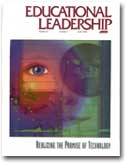It's just like a typical field trip to the zoo—except...
...you see the cheetahs up close in their natural habitat, accelerating to 60 miles per hour in 2.5 seconds;
...you find out why the cheetah population is dropping—and visit the laboratories of the National Zoo to find out about the reproductive research taking place there;
...a half dozen scientists—some young, some older, of different races and genders—answer your questions about the cheetahs, the zoo, and whatever else you'd like to know. If you think of a question later, you have two weeks after the field trip to ask it on the computer bulletin board.
Children who participate in Electronic Fieldtrips are on the cutting edge of learning. They explore topics that the texts don't address very well yet—topics like the new concept of biozoo (“What's Happening at the Zoo?”); the careers of female pilots and astronauts (“Women in Aerospace”); and the mysterious way the Federal Reserve Board functions (“The Savings Zone”).
Teachers receive a packet of print material with suggested hands-on class activites to use before the Electronic Fieldtrip. A 30-minute pretaped program presents background in preparation for the live event—an hour-long, interactive teleconference with experts (students call in questions on an 800 number).
Begun four years ago, Electronic Fieldtrips are produced by Fairfax County Public Schools Fairfax Network in collaboration with outside funders, for example, NASA and the National Science Foundation. The Network also produces other distance learning programs, including a foreign language studies program for elementary students and a multicultural series.
The Network offers the Electronic Fieldtrips to schools throughout the nation and in six other countries at no cost to the schools. Access to a satellite dish and modem is necessary for teleconferencing, but alternatively, you can access the program through local cable companies, television services, or on videotape.
Expect outstanding content and definite kid appeal. Middle school and high school students are the primary audience, but some programs appeal to younger students, too. The programs are “seamed” so that there are appropriate stops for classroom activities. Perhaps the best part of this distance-learning package is the interaction of student with adult—not the celebrity of a TV show but “the working expert,” whose enthusiasm for lifelong learning about his or her particular subject is catching.
Coming April 29–May 6: “Smithsonian's: NOAHS: The Keepers of the Ark,” about efforts to preserve animals in danger of extinction. Coming May 5–12: “Science in American Life,” a tour of a science-and-society exhibit at the Museum of American History.
For more information, write Judy Garcia, Electronic Fieldtrip Programmer, Fairfax Network, Fairfax County Public Schools, 4414 Holborn Ave., Annandale, VA 22003; or call (703) 503-7503.
